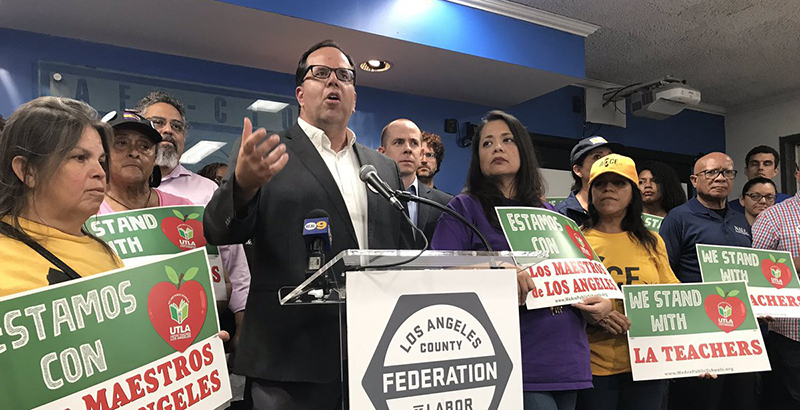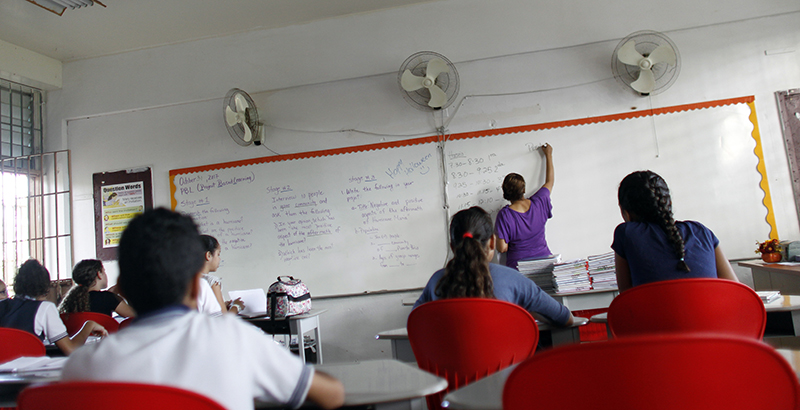The Top 2019 Priorities Inside America’s 15 Biggest School Districts: Teacher Strikes, Integration Fights, Sexual Misconduct Claims & More

EduClips is our weekly roundup of top education headlines from America’s 15 largest school districts, where more than 4 million students across eight states attend class every day. Read previous EduClips installments here. Get the week’s school and policy highlights delivered straight to your inbox by signing up for the TopSheet Education Newsletter.
Happy 2019! As teachers, students, and administrators return to schools today, we offer a quick recap on where the country’s top 15 districts stood at the end of 2018 and some of the most pressing issues, debates, and decisions awaiting America’s top district leaders in January.
Chicago — New Office on Sexual Violence Fields 600 Complaints Since Start of School Year: A new Chicago Public Schools office created to investigate cases of student-on-student sexual violence has fielded more than 600 allegations since September, according to district officials. Most of the 624 misconduct cases that came in to the Title IX office involved student-on-student allegations, the primary responsibility of the office, but 133 cases were related to allegations of misconduct by adults, with roughly half of those involving people who do not work for the district. District officials defended their response to sexual abuse allegations after the Chicago Tribune exposed failures in an investigation earlier in 2018. District deputy general counsel Douglas Henning described the shocking number of reports as part of a “new reality.” “We’re in a world now where it’s not OK to look the other way on any of this,” he said. (Read at the Chicago Tribune)
Palm Beach County — District Seeks Harvard’s Help to Curb Student Absenteeism Crisis: For the past decade, the rate of Palm Beach students who miss more than 10 days of school a year has hovered just above 20 percent. A significant number, some 20,000 students across the county, chalk up three weeks’ worth of absences in a school year, meeting the nation’s definition of “chronically absent.” This year, the district is one of eight across the country that have sought help from Harvard University and what researchers call their “Proving Ground,” which helps districts test-drive a number of potential solutions quickly, and do it in a way once reserved for clinical trials, with comparisons between test and control groups. The Harvard researchers then crunch the numbers and review the results with the district. The partnership with Harvard on the district’s chronic absenteeism problem is due to last at least three years. (Read at the Palm Beach Post)
Orange County — As Orlando Looks to Expand AP Class Offerings, Parents Push Back: Orange County school leaders have recently pushed to expand Advanced Placement course offerings in the school district’s 20 traditional high schools. The classes are meant to mimic introductory college courses and are offered in 38 subjects, from art history to chemistry to U.S. history. But Orange’s AP effort has rankled some educators and parents, who think too many students are enrolled in AP courses they don’t really want to take, and then are left to deal with too much homework and stress. “It was just overwhelming him,” said the parent of one senior. “He would have two to three hours of homework every night with just that [one] class.” (Read at the Orlando Sentinel)

Los Angeles — L.A. Braces for First Teachers’ Strike in 30 Years: Los Angeles teachers have set Jan. 10 as the date of their first strike in 30 years if contract talks between the union and the district don’t break out of their current stalemate. The strike would affect 30,000 teachers in the district’s 1,100 public schools and more than 480,000 students. Parents have often felt caught in the middle of a dispute that rests in part on the dire state of finances in the nation’s second largest school district. The district said that giving in to the union’s demands, which include higher salaries and lower class sizes, would bankrupt the district and lead to teacher layoffs. The union calls that assessment an overstatement and holds that the district is sitting on money that schools desperately need. (Read at LA School Report)
Clark County — In Two Years, Las Vegas’s ‘Achievement District’ Sees Slow, Steady Growth: More than two years after its initiation, Las Vegas’s Achievement School District — a state initiative that uses charters to fix underperforming schools and neighborhoods — is showing slow but steady growth after initially facing public backlash. “Obviously, I understand some of the challenges in the first year,” Achievement School District Director Rebecca Feiden said. “But these schools are adding to the options that parents and families have in their communities.” Amid overcrowded classrooms and back-to-back budget deficits in Clark County’s traditional public schools, opposition has receded since the district’s first year. Underperforming schools tapped for achievement district intervention face two options: competition from a new charter school that opens nearby or a complete takeover by a charter operator. (Read at the Las Vegas Review-Journal)
Hawaii — With 1 in 4 School Buildings Now More Than 100 Years Old, Repair Budget Eclipses Funds for School Modernization: The budget for repair work for the Hawaii Department of Education’s 256 aging school buildings is so high that it eclipses that for desired classroom upgrades, including facilities for new STEM labs. In Hawaii, where 1 in 4 school buildings is more than 100 years old and 2 in 5 are more than 65 years old, the department has a whopping backlog of 3,800 repair projects statewide. But even with a budget of $274 million, it can’t get to those repairs quickly enough “with the appropriation/design/bid/construction cycle averaging a glacial seven years,” according to Honolulu Civil Beat. The top maintenance priority for Hawaii’s schools is roofing repairs, followed by heating, air conditioning, and ventilation needs. (Read at Honolulu Civil Beat)

Broward County — Commission Discovers New Police Failures Tied to 2018 Parkland Massacre: In the weeks after a deadly school shooting in Parkland, Florida, criticism was focused on Scot Peterson, the armed sheriff’s deputy who heard the exploding gunfire but failed to run in and try to stop the massacre. But a state commission that has been investigating the Feb. 14 attack at Marjory Stoneman Douglas High School for the past 10 months found that the shortfall in the police response went much further. Seven other sheriff’s deputies who raced to the school and heard gunshots also stayed outside the building, the commission found, and officers lost even more time scrambling to retrieve bulletproof vests from their cars. A 400-page draft report of the commission released in December also found that a campus security monitor saw the gunman enter the building and was suspicious but did nothing to alert students. Mental health counselors knew the gunman was troubled but never had a complete picture of just how dangerous he had become. The commission’s final findings were expected Tuesday. (Read at The New York Times)
Fairfax County — In EEOC Complaint, Former Teacher Alleges Pregnancy Discrimination by District: A former Fairfax County teacher claims that administrators at the esteemed Thomas Jefferson High School for Science and Technology discriminated against her after she became pregnant, according to a complaint with the Equal Employment Opportunity Commission. The teacher, Amanda Hurowitz, said she was on maternity leave in April when she learned from the school’s principal and an assistant principal that her contract as a part-time teacher would not be renewed for the 2018-19 academic year. Hurowitz, who began teaching at Thomas Jefferson in 2006 and moved to part-time status after having a child in 2016, said she later learned that two other expectant or young mothers who taught humanities were also not rehired. “That began to look like pregnancy discrimination,” she said. (Read at The Washington Post)
Dallas — District Extends Schools Chief Hinojosa Following Success on Standards, Finances, Expansion of Choice: Michael Hinojosa, the highly regarded superintendent of the Dallas Independent School District, will stay on at least two more years under an updated contract unanimously approved in December. In the middle of his second stint as district chief (after first serving from 2005 to 2011, he returned in an interim capacity in the summer of 2015), Hinojosa is known for decreasing the number of schools failing state standards from 37 to four, launching school choice options, and bringing financial stability to the district. “This is my home, and I’m just glad I can still serve my district,” Hinojosa said. His contract now runs through Dec. 31, 2020, with no change in his $335,000 salary. (Read at the Dallas Morning News)

New York City — Racially Charged Battle Over Integrating City’s Elite Schools Heads to the Courts: A bitter racial dispute over Mayor Bill de Blasio’s plan to expand enrollment of black and Hispanic students in the city’s elite public high schools is now moving to the courts. In December, Asian-American civil rights groups and parents sued city officials, alleging that New York’s plan amounts to unconstitutional discrimination against Asian students, who occupy more than half of all seats at eight schools that rely on testing for admissions. The issue had been a largely political issue about whether the elite schools give an unfair advantage to one minority group over another, and whether integration deserves higher priority than maintaining uniform admissions standards. The question now goes to the courts, which have generally set a high bar for schools seeking to increase racial diversity. (Read at The Washington Post)
Houston — District Declines Help From Outside Organizations to Run Long-Struggling Schools as Possible State Takeover Looms: After Houston Independent School District trustees voted narrowly not to seek proposals from outside organizations to run long-struggling schools, those campuses will stay under local control, but the school board now faces a possible state takeover. The district could have pre-empted any punishment for two years if it had temporarily surrendered control of the four schools to outside groups. Now, to stave off major state sanctions, four district schools must meet state academic standards in 2019 after missing the mark for four-plus consecutive years. If any of those four schools fail to meet standards, the Texas Education Agency is legally required to replace the district’s entire school board and appoint new members or close still-failing schools. (Read at The Houston Chronicle)
Gwinnett County — Suit: Former Student Says Districts Punished Her for Lodging Assault Complaint: A former Gwinnett County Public Schools student has filed a federal lawsuit alleging that the school district violated her civil rights in their handling of a sexual assault complaint she brought against a fellow student. The plaintiff, identified only as Jane Doe, claims the district punished and retaliated against her for reporting that a fellow student assaulted her at Peachtree Ridge High School in February 2015. The next morning, Doe, a 16-year-old sophomore at the time, reported to school officials that a student forced her to perform a sexual act on her. According to the suit, a school police officer asked Doe what she did to provoke the attack, why she didn’t do more to resist, and why she didn’t report the incident sooner. Doe claims she was suspended for sexual misconduct and then suspended a second time for reporting the alleged sexual assault — a violation of her rights under federal Title IX law. (Read at the Atlanta Journal Constitution)

Puerto Rico — Island Hires Louisiana’s Pastorek to Aid Post-Maria Schools Overhaul: Paul Pastorek, the former Louisiana schools chief who helped lead the overhaul of New Orleans’s schools after Hurricane Katrina, will be working with Puerto Rico’s Department of Education as island schools continue their transformation after 2017’s Hurricane Maria. Pastorek’s contract with the department requires his assistance on issues including hurricane aid to the school system and implementing the state’s Every Student Succeeds Act plan. The contract reportedly runs until June 2019 and is worth a maximum of $155,000, at $250 an hour. Pastorek, Louisiana’s superintendent of Louisiana schools from 2007 to 2011, won praise from some quarters for the performance of New Orleans schools when they were placed under state control after Katrina. But teachers unions and others vigorously criticized him for being inflexible on policy matters and inattentive to the needs of teachers. (Read at Education Week)
Philadelphia: In the Wake of Newspaper Investigation, School Asbestos Problems Persist: The School District of Philadelphia is getting accolades for its revamped efforts to protect students from lead paint: The district cleaned up more than half a dozen schools, with 38 more cleanups planned. In the wake of the Philadelphia Inquirer’s “Toxic City: Sick Schools” investigation, city lawmakers and advocates are pushing the city to apply similar methods to an equally pressing crisis: asbestos. In September, the district announced, “All areas passed the re-occupancy criteria … and are safe for students and staff.” But the Inquirer recently declared that judgment to be premature. In two of seven schools examined, the district quickly found itself scrambling to clean up new asbestos contamination, and on Sept. 18, district officials discovered damaged asbestos insulation in a school auditorium that had just been cleaned and reopened to students. Such incidents mirror problems first pointed out in the paper’s initial investigation: inadequate training of maintenance workers, shoddy work by contractors, and poor oversight. (Read at The Philadelphia Inquirer)
Miami-Dade: Fueled by Higher Taxes, Teachers and District Reach Record Salary Accord: Miami-Dade County Public Schools and United Teachers of Dade struck a deal with an unprecedented $200 million for instructional personnel — a sum generously approved by voters who agreed to pay higher taxes, largely to finance higher pay for teachers. The groups struck a deal in December after the union accepted a three-tiered plan unveiled by the district. The plan includes a surprise bonus in January from the referendum funding for instructional personnel and full-time paraprofessionals, ahead of the double-digit percentage increase promised by the referendum ready in July. There was little discussion during bargaining about sharing funding with charter schools, which made a push to get a cut for charter teachers, who do not belong to a union. (Read at Miami Herald)
Noteworthy Essays & Reflections
EDUCATION PRIORITIES — The Misguided Priorities of Our Educational System (Read at The New York Times)
BLACK EDUCATION —America Is Sacrificing Black Education for a False Meritocracy (Read at New York Magazine)
PARENTS —The Age of Anxiety? Why More Educated Millennial Parents Are Telling Researchers They Want to Know How Their Kids Measure Up in School vs. Their Classmates (Read at The74Million.org)
HOMEWORK — Down With Homework, Say U.S. School Districts (Read at The Wall Street Journal)
PHYS ED —Physical education is key to longer, happier lives. Our kids and schools need more of it. (Read at USA Today)
Quotes of the Week
“None of these BSO deputies immediately responded to the gun shots by entering the campus and seeking out the shooter. Deputy sheriffs who took the time to retrieve vests from containers in their cruisers, removed certain equipment they were wearing so that they could put on their vests, and then replaced the equipment they had removed all while shots were being fired, or had been recently fired, is unacceptable and contrary to accepted protocol.” —from a draft report of the Florida state commission investigating the Feb. 14 attack at Marjory Stoneman Douglas High School. (Read at The New York Times)
“Sometimes a superintendent has to take certain actions regardless of what the law says. Whether or not those expulsions will stick, it’s immaterial. I had to show that it was enough concern for me that I’ve taken action against those students.” —Craig Pouncey, superintendent of a district in suburban Birmingham, Alabama, on his zero-tolerance approach to questionable student social media posts. (Read at The74Million.org)
“We’re in a world now where it’s not OK to look the other way on any of this. We’re in a world now where if you see something that makes you uncomfortable, that you think is wrong, you absolutely have to report that. … The culture is changing.” —district deputy general counsel Douglas Henning, on the district attempts to tackle systemic problems in its handling of school-related sexual abuse. (Read at the Chicago Tribune)
“I truly believe in merit. I think there should be equal opportunity for all. Diversity is a great thing, but do not lower the standards.” —Yi Fang Chen of Brooklyn, a mother of two, who is among the plaintiffs challenging New York City Mayor Bill de Blasio’s attempts to expand enrollment of black and Hispanic students in the city’s elite high schools. (Read at The Washington Post)
“We have young people who are increasingly disconnected, we have jobs and jobs and jobs that are unfilled, so we’ve got to build the bridges to make sure these kids get their jobs. There have never been bridges for our low-income and black students to good jobs.” —Cate Swinburn, president of YouthForce NOLA, a New Orleans nonprofit that provides job exposure and training across local industries for students beginning in ninth grade. (Read at The74Million.org)
Get stories like these delivered straight to your inbox. Sign up for The 74 Newsletter

;)

